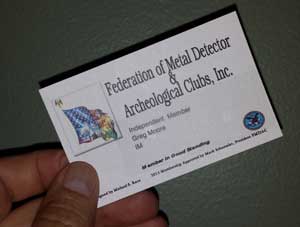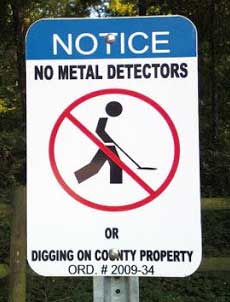I can recall how excited I was to get into the hobby of metal detecting, which soon turned to disappointment when I learned of a metal detecting ban in all of my city’s 120 metro parks. The metro parks bans were enacted soon after the state imposed a ban on metal detecting in all of my State’s parks. I had invested a lot of money in my metal detecting gear, and now struggle to find places that I am allowed to detect in my local area.
You may think that metal detecting is safe in your state, city, or local area, but I’ve got some bad news for you. New bans on metal detecting are being enacted on a more common basis now, and I really feel that this great hobby is in jeopardy. In the past, there wasn’t that much that you could do to combat these bans as an individual. People like Eddie Black from Louisville Kentucky have tried to fight these bans, but one person is no match for any legislative branch of any government.
Bans can be imposed for a number of reasons. Those who have metal detected in the parks and not properly filled their holes have brought the hobby into a negative light due to the damage they have left behind on park grounds. Archeologists have lobbied with their state representatives to enact metal detecting bans due to the fear that historical artifacts may be taken by individuals and not become the property of the state. The relationship between archeologists and metal detectorists is definitely strained. Efforts are underway for detectorists and archeologists to work together on projects which definitely helps, but these are few and far between.
So what can you do to help protect our great hobby?
Well, there are several organizations that have been formed to fight the bans on metal detecting. They are working to educate and improve the image of metal detecting. If you love the hobby of metal detecting, then there are two organizations that you need to check out and get involved in today!!! Getting involved is simple and will only require a minimal effort on your part.
 The Federation of Metal Detector & Archeological Clubs is an organization that has been quiet in recent years, but has really stepped up in recent months to actively work on resolving bans on metal detecting. They have elected new club officers that are energetic and offer a lot of hope to protecting the longevity of our hobby. Click on this How to Join link for more information on becoming a member. If you have a club, you can get a club membership. Or you can select the individual membership like I did. It costs an individual $10.00 a year to become a member. If you are a member of a metal detecting club, each member can join for only $5.00. In exchange for that you get a membership card, access to a lot of information and FMDAC hunts, and a quarterly newsletter. Most importantly, the funds collected help with the legal expenses involved in litigating metal detecting bans. It is a small price to pay to protect your hobby, and you can find that amount of clad in an afternoon park hunt.
The Federation of Metal Detector & Archeological Clubs is an organization that has been quiet in recent years, but has really stepped up in recent months to actively work on resolving bans on metal detecting. They have elected new club officers that are energetic and offer a lot of hope to protecting the longevity of our hobby. Click on this How to Join link for more information on becoming a member. If you have a club, you can get a club membership. Or you can select the individual membership like I did. It costs an individual $10.00 a year to become a member. If you are a member of a metal detecting club, each member can join for only $5.00. In exchange for that you get a membership card, access to a lot of information and FMDAC hunts, and a quarterly newsletter. Most importantly, the funds collected help with the legal expenses involved in litigating metal detecting bans. It is a small price to pay to protect your hobby, and you can find that amount of clad in an afternoon park hunt.
The other organization I recommend you check out is the Task Force for Metal Detecting Rights Foundation. Their goal is to promote and defend your right to enjoy the recreational hobby of metal detecting on public use lands and waterways. This is the place to go to find out about all of the current metal detecting bans and situations. They are currently involved in legal challenge in Cook County Illinois after metal detecting was banned in the Cook County Forest Preserve. They engaged a local attorney, got the conversation started with the General Superintendent of the Forest Preserve District, and appear to be coming to a resolution on the ban. I have heard that they will be coming to Louisville Kentucky next to help resolve the ban on the city’s 120 metro parks. In addition, the Task Force offers certified training for metal detecting. This training focuses on the metal detecting code of ethics. It talks about always having permission before going on private land, the proper way to dig and fill holes, what do to with items found that may have historical value, etc.
By joining these organizations, you can help by staying informed of the issues and conducting your metal detecting activities in an ethical fashion. You can also help by joining the efforts of others in the organization to make a phone call, send an email, or write a letter to the state or local government agencies who have enacted metal detecting bans in other areas. These requests are often designed to just put pressure on the agency to actually sit down with these metal detecting organizations and start a conversation about the bans. If we don’t have the conversations nothing will change and we will never find common ground.


I am a card carrying member too. Everyone should join these organizations if they want future generations to be able to enjoy the hobby of metal detecting.